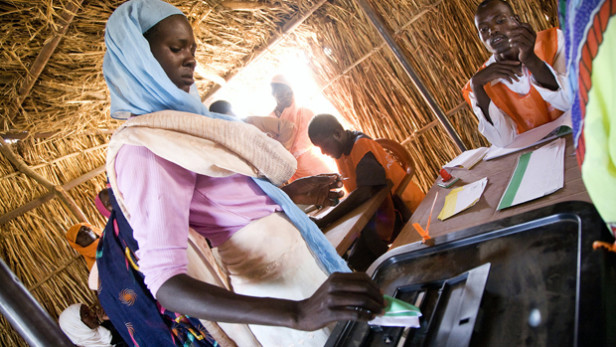Source: Devex
Democracy is not complete when women and other groups of individuals do not equally benefit from it, participants agreed at the Annual Democracy Forum 2014 in Gaborone, Botswana.
Hundreds of representatives from governments, multilateral institutions, nongovernmental organizations, academia and the private sector underscored at the forum that democracies should be in practice and not only in theory.
Gender is often closely linked to poverty in Africa. To achieve economic empowerment, women fight an uphill battle against inequality, political and cultural constraints that result in lack of access to health, education and nutrition. The "feminization" of poverty across the continent means that the poor and women are often one and the same in Africa — even in countries that identify themselves as democracies.
It's important to note that women reinvest 90 percent of their incomes in their children and families. Putting incomes and assets in the hands of women leads to higher investments in food security, health, nutrition, education and subsequently human development, in turn strengthening a country's democratic system.
To ensure that women substantially promote and benefit from democracy, Huguette Labelle, former chairwoman of the board at Berlin-based anti-corruption watchdog Transparency International, and Elsie Alexander, a feminist scholar and chairwoman of the Putting Women First Trust, a Botswana-based nonprofit, suggested the following four steps.
1. Increase the number of women represented in parliaments, cabinets and boards.
"We have some countries now where parliaments are half women and half men ... but there are still very few industries where their boards are half women, half men. Many don't have any women on their boards," said Labelle, adding that if democracies truly wants to succeed, it must to ensure gender diversity.
One shining example of democracy and women's empowerment in Africa, Alexander explained, is Botswana, where the equitable distribution of revenues from mineral resources has enabled the country to ensure it has more female parliamentarians than other African nations and that women get a chance to actively influence the policies that affect them.
"Democracy and development are two sides of the same coin ... [so] the participation of women in parliament, in policymaking and in cabinets is extremely important," she said. "Representation in these decision-making positions is important so that women participate and influence policy and the broader development agenda. You cannot influence policy if you are not there."
In southern Africa, where women account for only 10 percent of parliamentary seats, Alexander noted women should be educated and empowered to stand their ground and be encouraged to vote for other women, and this should be enshrined into law.
2. Have equal representation of all groups.
According to Alexander, international protocols have shown that democracy should not only result in equal representation of women and men, but also other marginalized social groups, such as persons with disabilities as well as minority ethnic groups such as the San in Botswana.
Since gaining independence in 1966, she said the Botswana government has done a "tremendous and impressive" job in promoting health and access to education, but it's still lacking in economic and political empowerment for women, marginal and other disadvantaged groups.
"We say democracy is about inclusive and participatory development, so we need to basically ensure innovative strategies to ensure that 90 percent of all groups participate in development and democracy," Alexander explained. "This is where we are lacking; we don't have adequate effective measures of ensuring that women participate."
3. Encourage civil sector participation and unity.
Participants at the Gaborone forum agreed that efforts to invite civil society organizations to sit in national consultations are ineffective, because governments often do not have the machinery to allow adequate representation. When reaching out to civil society, governments should make sure that civil societies from all sectors, representing most — if not all — groups are present in policy and development consultations. Formal and informal civil society organizations must unite and work together as one in order to influence negotiations and outcomes.
4. Civil society should partner with — not obey — donors.
A number of speakers urged civil society to "stop chasing projects," as this often detracts from their watchdog and advocacy role. Due to a lack of funds, NGOs are sometimes "at the mercy" of donor organizations who can dictate to them which projects to undertake.
"The donor can say, 'I am funding you for five years on this project,' but after five years the donor changes to another priority area — one day it's poverty, the next it's gender-based violence, and next HIV," Alexander said. "All of a sudden there is no continuity and sustainability in the prior project. Some organizations, because of this, drop by the wayside."
Partnerships, she stressed, can help address this problem by bringing donors and civil society together to jointly identify areas and priorities for action, determined by the government, local communities, civil society and the private sector.
The role of civil society, Alexander concluded, is to ensure a fruitful consultation process that will, in turn, encourage strong human rights advocacy and democracy in action.
#DemocracyMatters is a three-week series exploring the intersection of democracy, development and natural resources management in partnership with International IDEA, the Institute for Democracy and Electoral Assistance.

